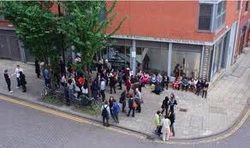First research workshop: Higher education and the arts & cultural
sector
|
Download Final Programme
Download: here
Getting there
|
Logo design by Robin Bini Schneider.
First research workshop: Higher education and the arts & cultural
sector
|
Download Final Programme
Download: here
Getting there
|
